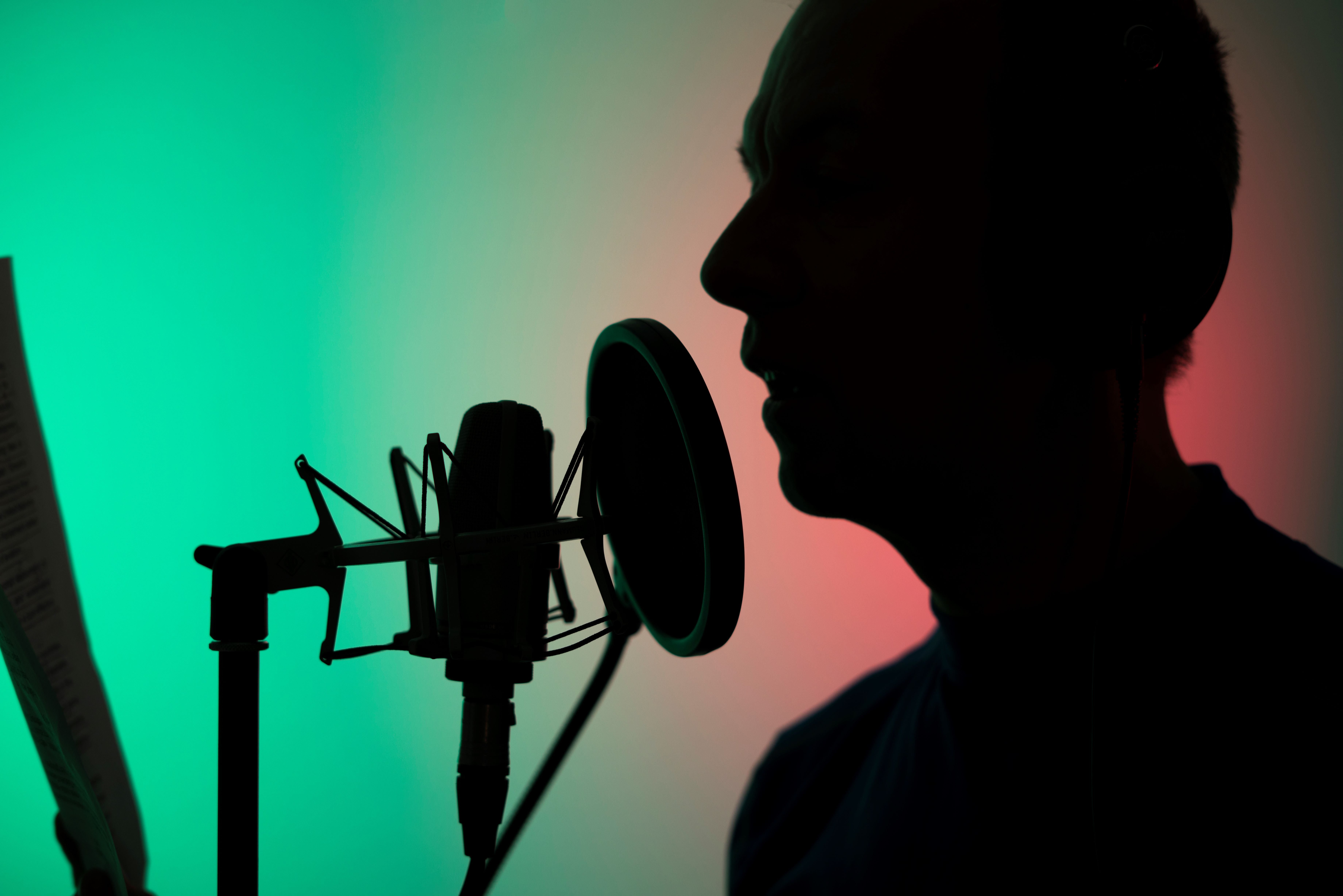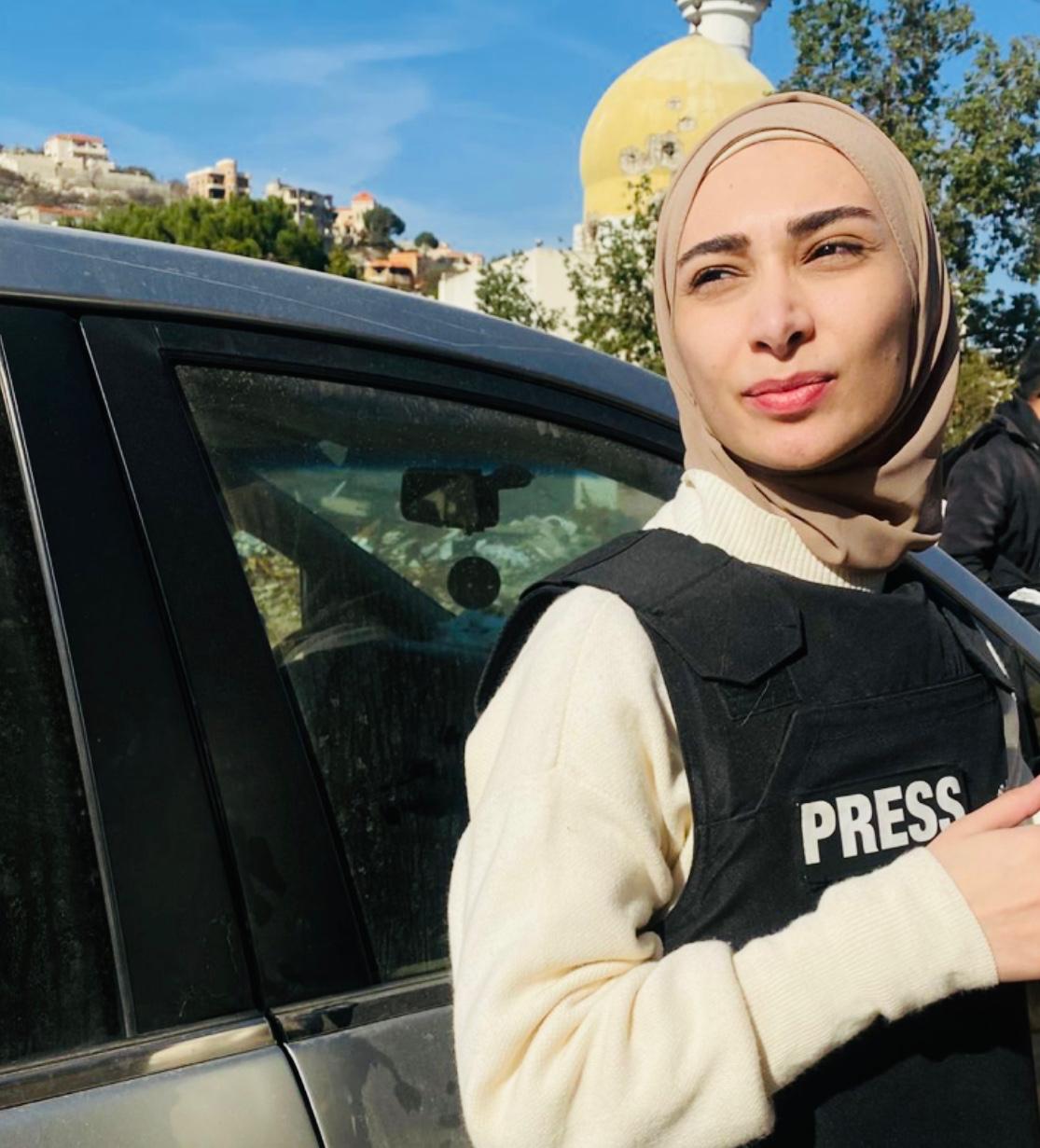في البداية كان المشهد كالتالي: فئة تعاملت بعقلانية وإيجابية مع التحولات الرقمية والتكنولوجية المستمرة، متأقلمة مع إمكانية دمج الذكاء الاصطناعي مع الموارد البشرية تماشيا مع متطلبات العصر، وفئة أخرى علت أصواتها ناقمة على هذا التحول ورافضة له. رأى هؤلاء أن الذكاء الاصطناعي سيهدد مصيرهم ومستقبلهم المهني، ولا سيما الأيدي العاملة المتمسكة بالهوية الكلاسيكية لمهنة الإعلام التي يصعب عليها تقبل فكرة الدمج والرقمنة، إلا أن الواقع دائما يفرض نفسه مهما كانت التوجهات والآراء متباينة ورافضة له.
التعليق الصوتي من المهن التي تحتاج إلى مهارات عالية جدا، وكغيرها من المجالات تواجه تحديات ومعايير وقواعد جديدة.
في كتاب الأداء الصوتي وفنونه الصادر عن معهد الجزيرة للإعلام، يستهل هاشم عبد السلام الكفاوين المقدمة بالجملة الآتية: للصوت البشري شكل وحتى لون، وللأداء الصوتي فن يجسد الصوت بأحسن ما يكون".
ولمجالات التعليق الصوتي شركات ومؤسسات تُعنى في استثمار الإنتاجات وتوزيعها دوليا وحتى عالميا، ابتداء من الإعلانات والدوبلاج والوثائقيات والكتب الصوتية والمقالات المقروءة، وصولا إلى المحتويات الإخبارية من تقارير ونشرات أخبار، وهي خدمة تقابلها أجور مرتفعة ومبالغ مالية ضخمة في سبيل إنتاجها. للصوت البشري إذًا دور كبير في صناعة المحتوى التجاري وإنتاجه، وهو مصدر دخل للمشتغلين به.
ما يميز العنصر البشري هو التوظيف الدقيق للمشاعر من حماس وفرح وحزم وغيرها ولا سيما عند تأدية نصوص في اللغة العربية.
في نقاش عفوي مع معلقين صوتيين عاملين في مجال الدوبلاج، يمكن أن نلخص مخاوفهم على النحو الآتي:
يخاف المعلق أن يُستبدَل به الذكاء الاصطناعي بشكل كلي فتنخفض أسعار خدماته في السوق، أو تزيد المنافسة في الوسط بفعل عملية الإنتاج الحديث.
التجارب الحالية تمكننا من الحصول على أصوات بنتائج جيدة بوصفنا محترفين وهواة مقابل مبالغ تبدأ من عشرين دولارا، على سبيل المثال من خلال الاشتراك في eleven labs الذي يقدم للمستخدم 29 لغة، هناك 27 صوتا للتعليق؛ بين أنثوي وذكوري، و٣٣٣ كلمة مجانية (أي ما يعادل 3 دقائق). ويمكننا إضافة الصوت إلى محتوانا المرئي وغير المرئي من دون الاستعانة بمعلق صوتي بشري.
قوة الصوت البشري
المعلق الصوتي والمدبلج في قناة ناشيونال جيوغرافي فؤاد شمص، لا يرى أن الذكاء الاصطناعي سوف يشكل خطرا على المواهب الصوتية المحترفة في مجال التعليق الصوتي في العالم العربي؛ ذلك أن الأداء البشري يمتلك أدوات ومكونات التنغيم والتعزيز والنبر، وهو ما يفتقر إليه الذكاء الاصطناعي اليوم. وما يميز العنصر البشري هو التوظيف الدقيق للمشاعر من حماس وفرح وحزم وغيرها ولا سيما عند تأدية نصوص في اللغة العربية، على خلاف مناهج التعليق الصوتي في الغرب وأوروبا، مما يلحظ في إيقاع الأداء السريع للنصوص المقروءة في الوثائقيات، ونشرات الأخبار، والإعلانات، وغيرها من الأنواع.
من ناحية أخرى، يرى شمص أن ثمة أنواعا من التسجيلات يستطيع الذكاء الاصطناعي تأديتها من الآن؛ مثل النصوص التاريخية والوثائقيات ونصوص البرامج التي تتسم بالجمود والجدية؛ لأنها لا تحتاج إلى أصوات جميلة، إنما تتطلب أداء صحيحا فقط.
أما عن مجالي الدوبلاج والإعلانات، فهما يحتاجان إلى العنصر البشري من مؤدٍّ ومخرج منفذ ومهندس صوت، ولا يمكن إيجاد العناصر مكتملة في البدائل الاصطناعية.
قانونيا، يطرح شمص مسألة غاية في الأهمية عن الملكية الفكرية والخصوصية للأصوات المولَّدة، والمخافة التي ينتظرها المعلق المحترف هي أن يُستخدَم صوته من دون علمه أو حتى تقاضيه ربع المبلغ الذي يحصله من حلقة تسجيل واحدة، أي يُتوقَّع على سبيل المثال أن يتقاضى المعلق مئة دولار بدلا من ٥٠٠ دولار للحلقة الواحدة.
فيما يتعلق بمراحل الإنتاج، توافق رنا ياسين، المديرة التنفيذية في شركة تانيا للإنتاج، أن "كل التوقعات تشير إلى أن الذكاء الاصطناعي سيكون له مستقبل ودور أساسي في الفترات المقبلة، وهذا من شأنه أن يزيد من سرعة الإنتاج ويقلل من بعض الأعباء التي تعاني منها شركات الدبلجة في السنوات الأخيرة، ولكن نستبعد أنه سيقدم جودة الأصوات نفسها وحيويتها والتعبير الإنساني الذي نجده في الكرتون والأعمال الدرامية، سواء من جهة الأداء التمثيلي وإعطاء الإحساس نفسه، أو من جهة اللفظ الصحيح لأسماء الشخصيات والمناطق على سبيل المثال، وكذلك في أداء الحوارات وطريقة الأداء في الإجابة والمؤثرات اللفظية". وتضيف رنا أنه "لا يمكن نكران أهمية الاستفادة من الذكاء الاصطناعي في التعليق الأساسي في الوثائقيات أو التسجيلات التعليمية لكن ليس بشكل كبير، بل إن كثيرا من الأعمال تُدبلَج بلهجات مختلفة وليس باللغة العربية الفصحى، فلا أعلم حقيقة إن كان بإمكان الذكاء الاصطناعي تغطية هذا الجانب".
كما ترى رنا ياسين أنه "قد نجد بعض الفائدة في عملية تحويل التعليق الصوتي إلى نص مكتوب، وهي العملية التي كانت تكلفنا في الواقع مبالغ إضافية؛ إذ يعتمد عملنا على النص إضافة إلى الصورة، وكنا نواجه تأخيرا في عمليات التسليم ومجهودا إضافيا وزيادة في التكاليف، ولكن من الطبيعي أن يظل للعنصر البشري دور أساسي قبل المرحلة النهائية من جهة المراجعة ومقارنة النص بالصورة ومدى مطابقتها للواقع.
ولأن الترجمة تعد جزءا مهما في مجالي الدبلجة والإنتاج، تشارك ياسين التحديات التي شهدها قطاع الترجمة ومصير المترجمين، لكن مع الوقت لوحظ أن الذكاء الاصطناعي كان عاملا مساعدا في تسريع عملية الترجمة، ولم تؤثر على المترجمين المحترفين من ناحية الصياغة والدقة اللغوية.
الشركات المنفذة والمؤسسات التلفزيونية لن تذهب إلى الاستعانة بالذكاء الاصطناعي في عملية الدبلجة؛ لأنه شئنا أم أبينا سيظهر ذلك بشكل واضح في الأداء، وسيؤثر بشكل كبير على الجودة النهائية للعمل.
في نهاية المطاف، نستنتج أن الشركات المنفذة والمؤسسات التلفزيونية (الكبرى منها على الأقل) لن تذهب إلى الاستعانة بالذكاء الاصطناعي في عملية الدبلجة؛ لأنه شئنا أم أبينا سيظهر ذلك بشكل واضح في الأداء، وسيؤثر بشكل كبير على الجودة النهائية للعمل، ولا يمكن التحكم به من ناحية بعض المحظورات والضوابط التي تعتمدها هذه المؤسسات، ولا سيما في الوطن العربي، مثل مصطلحات: الجنس، والمشروب، والممنوعات، وكل ما يرمز إلى الدين، وهي مصطلحات غالبا ما تُعدَّل عند ورودها في الأعمال الوثائقية أو الدرامية، وكذلك مصطلحات العنف اللفظي والجسدي؛ مثل التنمر، والحرب، والدماء، والعلاقات الأسرية والأخوية، والمصطلحات الدينية في الأعمال التي تخص الأطفال.
مهندسة الذكاء الاصطناعي لارا وهبة تنفي فرضية التهديد؛ فـ"الذكاء الاصطناعي على الرغم من تحقيقه نتائج جيدة، فلا يزال في مراحل غير ناضجة، وهو ما يعرف علميا بمرحلة الـbaby steps . وهذه المرحلة تنطبق على العالم الغربي والعربي معا، بيد أننا في العالم العربي نواجه مشكلات أكثر من الغرب؛ لأن اللغة العربية معقدة، والنتائج الحالية آلية بحتة، والهدف الأول من الاستنساخ هو الحصول على نتائج حقيقية. إضافة إلى تعدد اللهجات وتنوعها، الأمر الذي يزيد من صعوبة استخدام التقنيات باللغة العربية. بناء على ذلك، فإننا بحاجة إلى نصف قرن حتى يُستبدَل الروبوت بالمعلق الصوتي".
"نجد بعض الفائدة في عملية تحويل التعليق الصوتي إلى نص مكتوب، وهي العملية التي كانت تكلفنا في الواقع مبالغ إضافية؛ إذ يعتمد عملنا على النص إضافة إلى الصورة، وكنا نواجه تأخيرا في عمليات التسليم ومجهودا إضافيا وزيادة في التكاليف".
وعن فجوة التواصل بين التقنيين وأصحاب الشركات، تقول وهبة إن "المهندسين اليوم يعملون على تدريب هذه الآلات، من خلال معالجة اللغة بالذكاء الاصطناعي، وهو ما يختص به مهندس الذكاء الاصطناعي في مراكز الأبحاث والدراسات لتأمين موارد اللغة العربية، أما أصحاب الشركات فيزعمون أن الذكاء الاصطناعي هو أداة سحرية، بينما يحتاج التقني إلى بيانات ووقت ومعدات مستحدثة، لإدخال الكلمة والصوت وتدريب الآلة. التوقعات دائما عكس الحقيقة، باختصار لدينا توقعات عالية وإمكانات ضئيلة. وفيما يخص البطالة، فالمنافسة لن تقع بين المعلقين والآلة التي تستنسخ الصوت، إنما بين معلق صوتي ملم بالذكاء الاصطناعي في مجاله وآخر غير مطلع على التغيرات التي تشهدها مهنته".








































